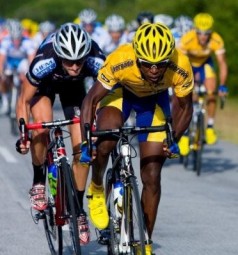A guest post by Noam Schimmel, from an article from Huffington Post – Taking Inspiration From Olympic Competitors: Rwanda’s Adrien Niyonshuti
When we think of the competitors in the Olympics it’s natural that we focus on their athletic talents and efforts. After all, that’s what brings them to compete in the Olympics.
We may hear from them in interviews about their efforts, the endless hours of training, the harsh physical demands, their hopes and challenges, their toughest moments and their moments of greatest achievement.
We know that their commitment is relentless, focused, intense, and uncompromising. In the face of the fiercest competition that is the only way to make it to the Olympics.
But if we scratch the surface of the Olympics with its focus on athletic prowess and competition we find – of course – a human community that is characterized by much more than its pursuit of sport.
Olympic players come with their own gifts and challenges, family backgrounds and life stories, legacies of adversity overcome and adversity that presents a daily challenge, practically and emotionally.
Olympic competitors are more than their dedication to sporting excellence. And it is worth taking a moment to examine the life of just one Olympic competitor to recognize the life experiences that individuals bring to the Olympic Games and to pay tribute to the sacrifices, stamina, and resilience that inform their Olympic journey.
Adrien Niyonshuti is a survivor. In 1994, the Rwandan genocide took the lives of over one million Tutsis and tens of thousands of Hutus who were murdered alongside them for refusing to submit to the racist ideology of the genocide.

Niyonshuti lost six of his brothers in the Rwandan genocide. He hid during the genocide, living in terror and never knowing if he would survive.
Inevitably, he carries those memories with him and the pain of losing his closest relatives in the genocide as well as friends and members of his extended family.
But Niyonshuti, while committed to remembering the past places great emphasis on the present and the future. Despite the legacy of loss and horror he carries he pushes onwards with faith in the resilience of his country, its people, and the capacity of Rwandans to rebuild their country on the basis of coexistence.
As we see Niyonshuti compete as a member of the Rwandan cycling team let us take a moment to reflect on the totality of what it means to be an Olympic player.
It is not just about sports competition. It is about the human spirit pushing onwards despite the most egregious of losses and extreme forms of suffering.
It is the faith of an individual in his own abilities and values despite having been targeted for murder because of his background and identity.
The Olympic ideal is one in which diversity does not threaten but actively inspires.
It is only when individuals from every nation come together at the Olympics that we can have the most truly comprehensive competition which is characterized by openness, inclusivity, equality, and diversity and the freedom of all to compete.
Niyonshuti embodies these Olympic ideals. They represent the polar opposite of the hatred and destructiveness which inspired the Rwandan genocide of the Tutsi.
For thousands of Rwandan genocide survivors Niyonshuti is an inspiration for how far all survivors can travel in rebuilding their lives and achieving their dreams against all odds.
He is also a reminder of the vulnerability that genocide survivors face. Resilience is most likely to result in a person who has survived catastrophic losses and threats to self only when they have support services – individuals, social programs, and organizations that reach out to them and support them.
It needs to be aided, carefully cultivated, and sustained. Survivors of genocide are uniquely disadvantaged and impoverished because of the genocide and the destruction of their families and communities and the killing of family members responsible for generating income, loss of housing and property, and the material and psychological costs of the genocide.
So let us us take inspiration from Niyonshuti and also remember and reflect upon the community of survivors from which he hails, the challenges that they face, and the capacity all of us have to reach out and make it possible for more individuals like Niyonshuti to realize their dreams.
Niyonshuti has emerged as an inspiration not only to survivors of the genocide but to all Rwandans.
His life and his competing at the 2012 Olympics is a tangible testimony of the triumph of the human spirit despite the most extreme forms of adversity.
Adrien Niyonshuti competes in the Men’s Mountain Bike Cross-Country Competition on Sunday 12th August.
